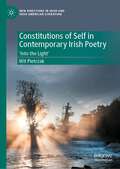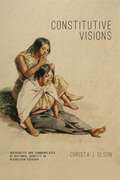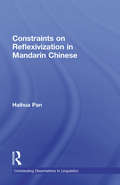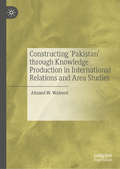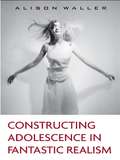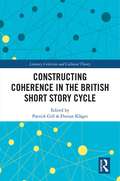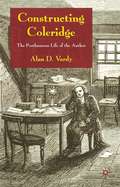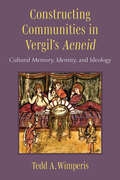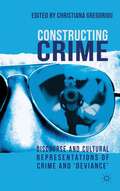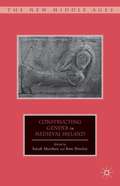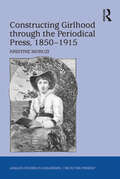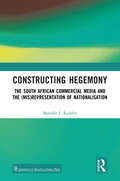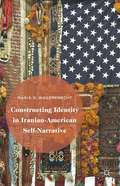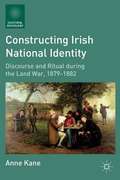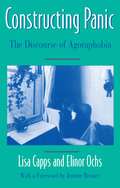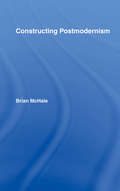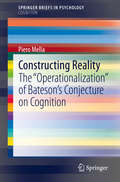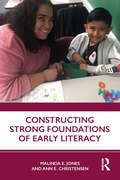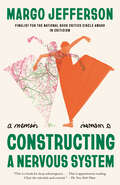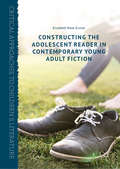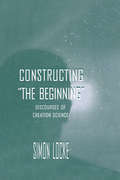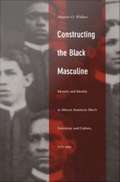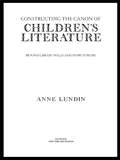- Table View
- List View
Constitutions of Self in Contemporary Irish Poetry: ‘Into the Light’ (New Directions in Irish and Irish American Literature)
by Wit PietrzakConstitutions of Self in Contemporary Irish Poetry explores the figure of the lyrical self in the work of six contemporary Irish poets: Paul Muldoon, Vona Groarke, Sinéad Morrissey, Caitríona O’Reilly, Alan Gillis and Nick Laird. By focusing on the self, this study offers the first sustained exploration of what is arguably one of the most distinctive features of Irish poetry. Readings utilise the latest theories of the lyric filtered through the work of such philosophers as Jacques Derrida, Umberto Eco, Slavoj Žižek, Giorgio Agamben and Zygmunt Bauman, and connect an interdisciplinary approach with attention to the operations of the poetic text to bring out aspects of the self in Irish writing that have been given only cursory critical attention so far.
Constitutive Visions: Indigeneity and Commonplaces of National Identity in Republican Ecuador (Rhetoric and Democratic Deliberation #9)
by Christa J. OlsonIn Constitutive Visions, Christa Olson presents the rhetorical history of republican Ecuador as punctuated by repeated arguments over national identity. Those arguments—as they advanced theories of citizenship, popular sovereignty, and republican modernity—struggled to reconcile the presence of Ecuador’s large indigenous population with the dominance of a white-mestizo minority. Even as indigenous people were excluded from civic life, images of them proliferated in speeches, periodicals, and artworks during Ecuador’s long process of nation formation. Tracing how that contradiction illuminates the textures of national-identity formation, Constitutive Visions places petitions from indigenous laborers alongside oil paintings, overlays woodblock illustrations with legislative debates, and analyzes Ecuador’s nineteen constitutions in light of landscape painting. Taken together, these juxtapositions make sense of the contradictions that sustained and unsettled the postcolonial nation-state.
Constitutive Visions: Indigeneity and Commonplaces of National Identity in Republican Ecuador (Rhetoric and Democratic Deliberation)
by Christa J. OlsonIn Constitutive Visions, Christa Olson presents the rhetorical history of republican Ecuador as punctuated by repeated arguments over national identity. Those arguments—as they advanced theories of citizenship, popular sovereignty, and republican modernity—struggled to reconcile the presence of Ecuador’s large indigenous population with the dominance of a white-mestizo minority. Even as indigenous people were excluded from civic life, images of them proliferated in speeches, periodicals, and artworks during Ecuador’s long process of nation formation. Tracing how that contradiction illuminates the textures of national-identity formation, Constitutive Visions places petitions from indigenous laborers alongside oil paintings, overlays woodblock illustrations with legislative debates, and analyzes Ecuador’s nineteen constitutions in light of landscape painting. Taken together, these juxtapositions make sense of the contradictions that sustained and unsettled the postcolonial nation-state.
Constraints on Language Acquisition: Studies of Atypical Children
by Helen Tager-FlusbergAfter decades of research most scholars generally agree that language acquisition is a complex and multifaceted process that involves the interaction of innate biologically-based mechanisms devoted to language, other non-linguistic cognitive and social mechanisms, linguistic input, and information about the social and physical world. Theoretical work in the field of language acquisition now needs to focus in greater depth and detail on some specific aspects of this general model, which is the main goal of this book. The chapters in this volume provide some new insights into one of the most remarkable accomplishments achieved by almost all children. The particular questions that are raised by contributors include: * What kinds of constraints operate on the process of language development? * Which aspects of the acquisition process depend on language-specific mechanisms? * Are there critical brain structures necessary for the acquisition of language? * What role do cognitive and social mechanisms play in language development? * How critical is perceptual input about the physical and social world? * What is the specific role played by linguistic input in the child's construction of a linguistic system? Questions are addressed from the perspective of children who come to the task of acquiring language with many hurdles to overcome, including deafness and blindness, mental retardation, autism, and prenatal or perinatal brain damage involving the left hemisphere. Each section contributes some insight on how an innate language-specific biological substrate interacts with cognitive and social factors, as well as external information, to support the child's construction of a linguistic system. Studies of atypical children offer a singular contribution to this enterprise by allowing us to see the specific influences of each component, and in turn, they shed new light on how all children are able to acquire language so effortlessly and during such a brief period of development.
Constraints on Reflexivization in Mandarin Chinese (Outstanding Dissertations in Linguistics)
by Haihua PanFirst Published in 1997. Routledge is an imprint of Taylor & Francis, an informa company.
Constructing 'Pakistan' through Knowledge Production in International Relations and Area Studies
by Ahmed W. WaheedThis book analyses the discourse on Pakistan by exploring the knowledge production processes through which the International Relations community, Asian and South Asian area study centres, and think-tanks construct Pakistan’s identity. This book does not attempt to trace how Pakistan has been historically defined, explained, or understood by the International Relations interpretive communities or to supplant these understandings with the author’s version of what Pakistan is. Instead, this study focuses on investigating how the identity of Pakistan is fixed or stabilized via practices of the interpretive communities. In other words, this book attempts to address the following questions: How is the knowledge on Pakistan produced discursively? How is this knowledge represented in the writings on Pakistan? What are the conditions under which it is possible to make authoritative claims about Pakistan?
Constructing Adolescence in Fantastic Realism (Children's Literature and Culture)
by Alison WallerConstructing Adolescence in Fantastic Realism examines those fundamental themes which inform our understanding of "the teenager"—themes that emerge in both literary and cultural contexts. Models of adolescence do not arise solely from discourses of psychology, sociology, and education. Rather, these models—frameworks including developmentalism, identity formation, social agency, and subjectivity in cultural space—can also be found represented symbolically in fantastic tropes such as metamorphosis, time-slip, hauntings, doppelgangers, invisibility, magic gifts, and witchcraft. These are the incredible, supernatural, and magical elements that invade the everyday and diurnal world of fantastic realism. In this original study, Alison Waller proposes a new critical term to categorize a popular and established genre in literature for teenagers: young adult fantastic realism. Though fantastic realism plays a crucial part in the short history of young adult literature, up until now this genre has typically been overlooked or subsumed into the wider class of fantasy. Touching on well-known authors including Robert Cormier, Melvin Burgess, Gillian Cross, Margaret Mahy, K.M. Peyton and Robert Westall, as well as previously unexamined writers, Waller explores the themes and ideological perspectives embedded in fantastic realist novels in order to ask whether parallel realities and fantastic identities produce forms of adolescence that are dynamic and subversive. One of the first studies to deal with late twentieth-century fantastic literature for young adults, this book makes a valuable contribution to our understanding of adult attitudes toward adolescent identity.
Constructing Coherence in the British Short Story Cycle (Literary Criticism and Cultural Theory)
by Florian Kläger Patrick GillThe first major collection of essays on the contemporary British short story cycle, this volume offers in-depth explorations of the genre by comparing its strategies for creating coherence with those of the novel and the short story collection, inquiring after the ties that bind individual short stories into a cycle. A section on theory approaches the form from the point of view of genre theory, cognitive literary studies, and book studies. It is followed by investigations of hitherto neglected aspects of the generic tradition of the British short story cycle and how they relate to the contemporary outlook of the form. Readings of individual contemporary cycles, illustrating the form’s multifaceted uses from the presentation of sexual identities to politics and trauma, make up the third and most substantial part of the volume, placing its focus squarely on the past decades. Unique in its combination of a focus on the literary traditions, politics and markets of the UK with a thorough examination of the genre’s manifold formal and thematic potentials, the volume explores what is at the heart of the short story cycle as a literary form: the constant negotiation between unity and separateness, collective and individual, of coherence and autonomy.
Constructing Coleridge
by Alan D. VardyConstructing Coleridge examines Coleridge's penchant for re-invention and carefully demonstrates how the Coleridge family editors followed his lead in constructing his posthumous reputation. Following his death in 1834, the family editors faced immediate scandals and sought to construct the Coleridge they preferred in these trying circumstances.
Constructing Communities in Vergil's Aeneid: Cultural Memory, Identity, and Ideology
by Tedd A. WimperisConstructing Communities in Vergil's Aeneid: Cultural Memory, Identity, and Ideology presents a new examination of memory, ethnic identity, and politics within the fictional world of this Roman epic, drawing previously unexplored connections between Vergil’s characters, settings, and narrative and the political context of the early Roman Empire. This book investigates how the Aeneid’s fictive ethnic communities—the Trojans, Carthaginians, Latins, and Arcadians who populate its poetic world—are shown to have identities, myths, and cultural memories of their own. And much like their real-life Roman counterparts, they engage in the politics of the past in such contexts as royal iconography, diplomacy, public displays, and incitements to war. Where previous studies of identity and memory in the Aeneid have focused on the poem’s constructions of Roman identity, Constructing Communities turns the spotlight onto the characters themselves to show how the world inside the poem is replicating, as if in miniature, real forms of contemporary political and cultural discourse, reflecting an historical milieu where appeals to Roman identity were vigorously asserted in political rhetoric. The book applies this evidence to a broad literary analysis of the Aeneid, as well as a reevaluation of its engagement with Roman imperial ideology in the Age of Augustus.
Constructing Crime
by Christiana GregoriouCrime and criminals are a pervasive theme in all areas of our culture, including media, journalism, film and literature. This book explores how crime is constructed and culturally represented through a range of areas including Spanish, English Language and Literature, Music, Criminology, Gender, Law, Cultural and Criminal Justice Studies.
Constructing Gender In Medieval Ireland
by Sarah Sheehan Ann DooleyMedieval Irish texts reveal distinctive and unexpected constructions of gender. Constructing Gender in Medieval Ireland illuminates these ideas through its fresh and provocative re-readings of a wide range of texts, including saga, romance, legal texts, Fenian narrative, hagiography, and ecclesiastical verse.
Constructing Girlhood through the Periodical Press, 1850-1915 (Studies in Childhood, 1700 to the Present)
by Kristine MoruziFocusing on six popular British girls' periodicals, Kristine Moruzi explores the debate about the shifting nature of Victorian girlhood between 1850 and 1915. During an era of significant political, social, and economic change, girls' periodicals demonstrate the difficulties of fashioning a coherent, consistent model of girlhood. The mixed-genre format of these magazines, Moruzi suggests, allowed inconsistencies and tensions between competing feminine ideals to exist within the same publication. Adopting a case study approach, Moruzi shows that the Monthly Packet, the Girl of the Period Miscellany, the Girl's Own Paper, Atalanta, the Young Woman, and the Girl's Realm each attempted to define and refine a unique type of girl, particularly the religious girl, the 'Girl of the Period,' the healthy girl, the educated girl, the marrying girl, and the modern girl. These periodicals reflected the challenges of embracing the changing conditions of girls' lives while also attempting to maintain traditional feminine ideals of purity and morality. By analyzing the competing discourses within girls' periodicals, Moruzi's book demonstrates how they were able to frame feminine behaviour in ways that both reinforced and redefined the changing role of girls in nineteenth-century society while also allowing girl readers the opportunity to respond to these definitions.
Constructing Hegemony: The South African Commercial Media and the (Mis)Representation of Nationalisation
by Mandla J. RadebePost-apartheid South Africa continues to face challenges in its attempts at economic transformation from decades of apartheid and colonisation. This need for revolution has resulted in various policy initiatives, including the ongoing demands for the nationalisation of the economy. The commercial media has a central role in shaping policy debates. But this media is an ideological tool and an economic resource since it is owned and controlled by people with political and economic interests and, therefore, tends to support and promote their interests. This book provides a Marxist critique of the representation of the nationalisation of the mines debate by the South African commercial media. Radebe examines corporate control of the media to articulate the interrelations between the State, Capital and the Media and how commercial media represents, shapes and influences public policy. He concludes that beyond factors such as ownership, commercialisation and the influence of advertising on news content, the global capitalist hegemony has a more powerful effect on the commercial media in South Africa than previously thought. Print edition not for sale in Sub Saharan Africa.
Constructing Identity in Iranian-American Self-Narrative
by Maria D. WagenknechtShaped by the experiences of the Iranian Revolution, Iranian-American autobiographers use this chaotic past to tell their current stories in the United States. Wagenknecht analyzes a wide range of such writing and draws new conclusions about migration, exile, and life between different and often clashing cultures.
Constructing Irish National Identity
by Anne KaneA major statement in both historical and cultural sociology, "Constructing Irish Nationalist Identity: Ritual and Discourse during the Land War, 1879-1882," provides a theoretical and methodological model for analyzing symbolic and social transformation in major historical events. Synthesizing the strong program in cultural sociology with eventful temporality, Anne Kane demonstrates the construction of political alliance and the emergence of a counter hegemonic cultural structure over the course of a political movement and campaign. Through deep analysis of the discursive struggles of contentious participants - tenant farmers, nationalists, and the Irish Catholic Church - in the multitudinous enchained ritualistic events of the Irish Land War, Kane illuminates the construction of a reconfigured Irish Nationalist Identity.
Constructing Panic: The Discourse of Agoraphobia
by Elinor Ochs Lisa CappsMeg Logan has not been farther than two miles from home in six years. She has agoraphobia, a debilitating anxiety disorder that entraps its sufferers in the fear of leaving safe havens such as home. Paradoxically, while at this safe haven, agoraphobics spend much of their time ruminating over past panic experiences and imagining similar hypothetical situations. In doing so, they create a narrative that both describes their experience and locks them into it. Constructing Panic offers an unprecedented analysis of one patient's experience of agoraphobia. In this novel interdisciplinary collaboration between a clinical psychologist and a linguist, the authors probe Meg's stories for constructions of emotions, actions, and events. They illustrate how Meg uses grammar and narrative structure to create and recreate emotional experiences that maintain her agoraphobic identity. In this work Capps and Ochs propose a startling new view of agoraphobia as a communicative disorder. Constructing Panic opens up the largely overlooked potential for linguistic and narrative analysis by revealing the roots of panic and by offering a unique framework for therapeutic intervention. Readers will find in these pages hope for managing panic through careful attention to how we tell the story of our lives.
Constructing Postmodernism
by Brian McHaleBrian McHale provides a series of readings of a wide range of postmodernist fiction, from Eco's Foucault's Pendulum to the works of cyberpunk science-fiction, relating the works to aspects of postmodern popular culture.
Constructing Reality: The "Operationalization" of Bateson’s Conjecture on Cognition (SpringerBriefs in Psychology)
by Piero MellaThis brief presents an overview of Gregory Bateson’s Constructivist method of Cognition. Bateson proposes a theory of cognition that is based on the abstract notion of difference that the mind distinguishes and perceives and represents information that constitutes and separates how different states are ordered, grouped, and classified. Bateson, however, does not clearly indicate how a cognitive system can develop a knowledge of reality from the perception of these differences. This book seeks to offer a scientific approach to Constructivism. Using Bateson’s hypothesis, chapters discuss how our mind distinguishes and elaborates differences, allowing us to form perceptions of objects, and how these objects can be described and compared. Chapters also discuss how from differences, it is possible to construct concepts or ideas of how these can be defined and how to derive from these differences the meanings of the signs used for the structuring of languages. The brief offers a coherent structure of propositions that form an interpretative theory of the modus operandi of the human mind, which will be useful not only in shedding light on our cognitive processes, but also in laying the formal groundwork for artificial intelligence. Constructing Reality is a must-have resource for researchers and students of the cognitive sciences, as well as education sciences, and researchers and scholars of artificial intelligence, learning theory, and intelligent automata programming.
Constructing Strong Foundations of Early Literacy
by Malinda E. Jones Ann E. ChristensenThis text provides a comprehensive understanding of the foundational literacy knowledge, skills, behaviors, and attitudes necessary to guide emerging readers and writers in early childhood. Centered on the critical question of why some children learn to read easily, while others do not, this text walks readers through developmentally appropriate goal setting based on the foundational literacy skills that are critical for preschool and kindergarten children to develop. Written in an authoritative yet accessible style, chapters offer instructional strategies, insights, and scenarios from educators, self-reflection, and a variety of methods for implementation. Each chapter also includes differentiation for children with language and learning challenges as well as dual language learners, exploring methods for valuing the home language while building critical literacy skills in the classroom. Providing critical skills for guiding all emerging readers to an independent reading level, this is an essential resource for both students in early childhood, literacy, and special education courses and educators in early childhood public education, non-profit preschool settings such as Head Start, home and daycare settings, and private and corporate care and education centers.
Constructing a Nervous System: A Memoir
by Margo JeffersonThe award-winning critic and memoirist Margo Jefferson has lived in the thrall of a cast of others—her parents and maternal grandmother, jazz luminaries, writers, artists, athletes, and stars. These are the figures who thrill and trouble her, and who have made up her sense of self as a person and as a writer. In her much-anticipated follow-up to Negroland, Jefferson brings these figures to life in a memoir of stunning originality, a performance of the elements that comprise and occupy the mind of one of our foremost critics. <p><p> In Constructing a Nervous System, Jefferson shatters her self into pieces and recombines them into a new and vital apparatus on the page, fusing the criticism that she is known for, fragments of the family members she grieves for, and signal moments from her life, as well as the words of those who have peopled her past and accompanied her in her solitude, dramatized here like never before. <p><p> Bing Crosby and Ike Turner are among the author’s alter egos. The sounds of a jazz LP emerge as the intimate and instructive sounds of a parent’s voice. W. E. B. Du Bois and George Eliot meet illicitly. The muscles and movements of a ballerina are spliced with those of an Olympic runner, becoming a template for what a black female body can be. <p><p> The result is a wildly innovative work of depth and stirring beauty. It is defined by fractures and dissonance, longing and ecstasy, and a persistent searching. Jefferson interrogates her own self as well as the act of writing memoir, and probes the fissures at the center of American cultural life.
Constructing the Adolescent Reader in Contemporary Young Adult Fiction (Critical Approaches to Children's Literature)
by Elisabeth Rose GrunerThis book examines the way young adult readers are constructed in a variety of contemporary young adult fictions, arguing that contemporary young adult novels depict readers as agents. Reading, these novels suggest, is neither an unalloyed good nor a dangerous ploy, but rather an essential, occasionally fraught, by turns escapist and instrumental, deeply pleasurable, and highly contentious activity that has value far beyond the classroom skills or the specific content it conveys. After an introductory chapter that examines the state of reading and young adult fiction today, the book examines novels that depict reading in school, gendered and racialized reading, reading magical and religious books, and reading as a means to developing civic agency. These examinations reveal that books for teens depict teen readers as doers, and suggest that their ability to read deeply, critically, and communally is crucial to the development of adolescent agency.
Constructing the Beginning: Discourses of Creation Science (Routledge Communication Series)
by Simon LockeIn Constructing the Beginning, Simon Locke offers a new approach to considering the enigma of creation science, using the perspective of discourse analysis. Using the publications of the British Creation Science Movement to perform a detailed analysis of the creationist case, Locke demonstrates that the discourses and rhetorics used by natural and social scientists are also employed by non-scientists. Out of this study, a view of science as a cultural resource develops, questioning the adequacy of perceived sociological wisdom that sees science as the source and emmbodiment of cultural "rationalization." As a case study of the use of science as a discursive resource in everyday life, Constructing the Beginning speaks to scholars of discourse analysis, constructionism, rhetorics, and the public understanding of science. It will also be of great interest to scholars in the areas of cultural studies, sociology of scientific knowledge and of religion, postmodernism, and sociological theory. Additional Copy Creation science is the target of much attack these days from both within and outside of the orthodox scientific community. This book, however, takes a different approach. It is not an attack on creationism; nor is it a defense. The author's interest is not in creationism at all, but rather, it is in the questions of the role and significance of science in modernity or the public understanding of science. Locke's approach to this issue is a discursive and rhetorical one. Creationism is treated as a case study of the argumentative engagement between science and non-science which--in his view--is as central to the commonsense lifeworld of modernity as much as it is to the lives of its intellectuals. An important dimension of the public meaning of science in modernity is its limits and its relations with other modes of thought and belief, which continue to survive as discourses in the wider culture. Creationism is merely one example of this general feature. The book begins with a discussion of the current issues in the public understanding of science in relation to traditional sociological views of the impact of science on modernity. This is examined through rationalization and the contrasting view derived from the sociology of scientific knowledge which points to the likelihood of a much more complex and variable relationship than rationalization proposes. It continues with an argument and detailed analysis that focuses on three main points: *the problem of a competing account of reality (the world), in the form of evolution; *the problem of competing accounts of the Bible (the Word), in the form of different versions of Christianity; and *the realization that both of these problems must be managed together in such a way that creationists' own version(s) of the world and of the Word are compatible--a compatibility achieved through a discursive syncretism. The final chapter brings together the strands of the argument to further develop the implications of the dilemma of science for the public understanding of science through the idea of science as a cultural resource and its possible relation to other such cultural resources within modernity--such as Christianity. It is suggested that much so-called "anti-science" could be made sense of in these terms and proposes further research in this direction.
Constructing the Black Masculine: Identity and Ideality in African American Men's Literature and Culture, 1775-1995
by Maurice O. WallaceIn seven representative episodes of black masculine literary and cultural history--from the founding of the first African American Masonic lodge in 1775 to the 1990s choreographies of modern dance genius Bill T. Jones--Constructing the Black Masculine maps black men's historical efforts to negotiate the frequently discordant relationship between blackness and maleness in the cultural logic of American identity. Maurice O. Wallace draws on an impressive variety of material to investigate the survivalist strategies employed by black men who have had to endure the disjunction between race and masculinity in American culture. Highlighting their chronic objectification under the gaze of white eyes, Wallace argues that black men suffer a social and representational crisis in being at once seen and unseen, fetish and phantasm, spectacle and shadow in the American racial imagination. Invisible and disregarded on one hand, black men, perceived as potential threats to society, simultaneously face the reality of hypervisibility and perpetual surveillance. Paying significant attention to the sociotechnologies of vision and image production over two centuries, Wallace shows how African American men--as soldiers, Freemasons, and romantic heroes--have sought both to realize the ideal image of the American masculine subject and to deconstruct it in expressive mediums like modern dance, photography, and theatre. Throughout, he draws on the experiences and theories of such notable figures as Frederick Douglass, W. E. B. Du Bois, Booker T. Washington, and James Baldwin.
Constructing the Canon of Children's Literature: Beyond Library Walls and Ivory Towers (Children's Literature and Culture #Vol. 31)
by Anne LundinIn this pioneering historical study, Anne Lundin argues that schools, libraries, professional organizations, and the media together create and influence the constantly changing canon of children's literature. Lundin examines the circumstances out of which the canon emerges, and its effect on the production of children's literature. The volume includes a comprehensive list of canonical titles for reference.
